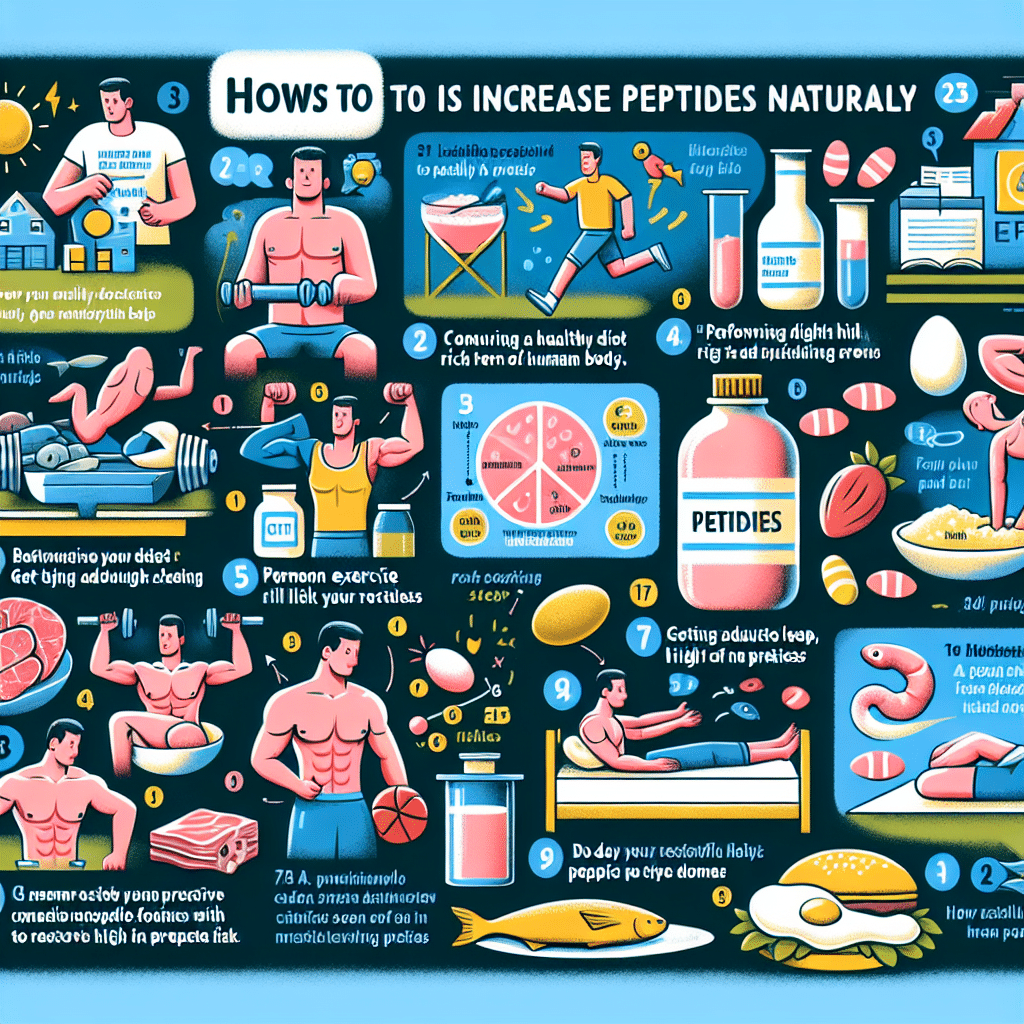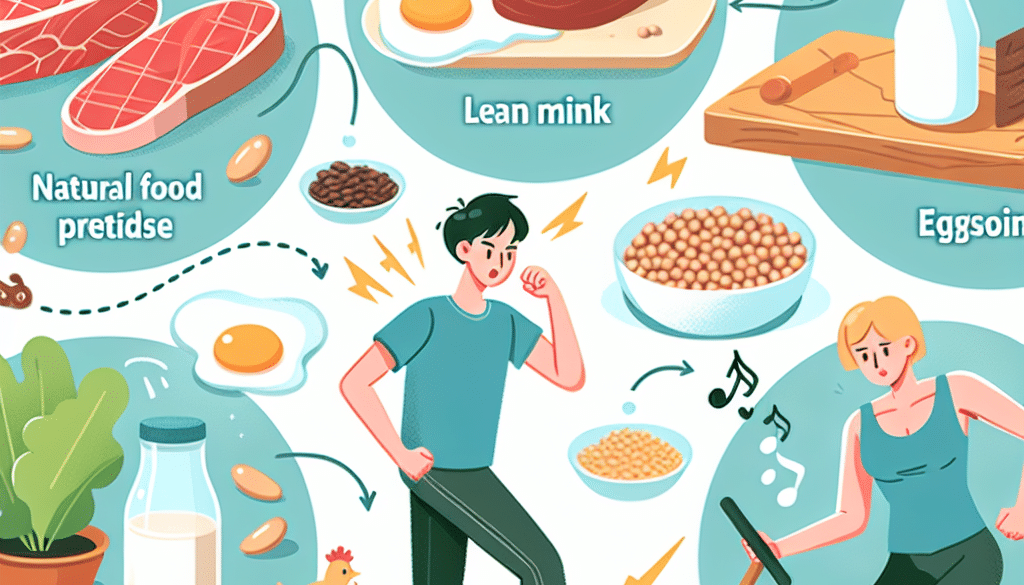How Can I Increase My Peptides Naturally?
-
Table of Contents
- Increase Your Peptides Naturally: Effective Strategies and Tips
- Understanding the Importance of Peptides
- Nutrition: The Foundation for Peptide Production
- Exercise: A Catalyst for Peptide Production
- Stress Management and Sleep: Regulating Peptide Levels
- Supplementation: Aiding Natural Peptide Production
- Hydration and Digestive Health: Supporting Peptide Absorption
- Conclusion: Integrating Natural Peptide Enhancement into Your Lifestyle
- Discover ETprotein’s High-Quality Protein Products
Increase Your Peptides Naturally: Effective Strategies and Tips

Peptides are short chains of amino acids that are integral to numerous biological processes in the human body. They play a crucial role in the functioning of hormones, enzymes, and immune cells, among others. With the growing interest in health and wellness, many people are seeking ways to increase their peptide levels naturally to enhance their overall well-being. In this article, we will explore various methods to boost peptide production within the body through diet, lifestyle changes, and other natural means.
Understanding the Importance of Peptides
Before delving into how to increase peptides naturally, it’s essential to understand their significance. Peptides serve as building blocks for proteins and perform various functions, including acting as neurotransmitters, hormones, and natural pain relievers. They can also have anti-inflammatory, antimicrobial, and anti-aging properties, making them a key focus for those looking to improve their health.
Nutrition: The Foundation for Peptide Production
A balanced diet rich in protein is the cornerstone of natural peptide production. Proteins are broken down into peptides and amino acids, which are then used by the body to create new peptides as needed. Here are some dietary tips to enhance peptide synthesis:
- High-Quality Protein Sources: Include a variety of protein-rich foods such as lean meats, fish, eggs, dairy products, legumes, and nuts. These foods provide the essential amino acids required for peptide formation.
- Collagen-Rich Foods: Consuming foods high in collagen, like bone broth, can directly supply certain types of peptides known for their skin and joint health benefits.
- Antioxidant-Rich Foods: Fruits and vegetables loaded with antioxidants can protect peptide bonds from oxidative stress, ensuring their stability and function.
Exercise: A Catalyst for Peptide Production
Physical activity is another effective way to boost natural peptide levels. Exercise stimulates the release of growth hormone, which in turn promotes the production of peptides that aid in muscle repair, growth, and recovery. Here are some exercise-related tips:
- Resistance Training: Engaging in weightlifting or bodyweight exercises can increase muscle mass and, consequently, the production of muscle-specific peptides.
- Cardiovascular Exercise: Aerobic activities like running, cycling, or swimming can enhance the release of peptides related to cardiovascular health and fat metabolism.
- Consistency: Regular exercise is key. Aim for at least 150 minutes of moderate-intensity or 75 minutes of high-intensity exercise per week, as recommended by health authorities.
Stress Management and Sleep: Regulating Peptide Levels
Stress and sleep have profound effects on hormone and peptide levels. Managing stress and getting adequate sleep are essential for maintaining a healthy balance of peptides in the body:
- Stress Reduction Techniques: Practices such as meditation, yoga, and deep breathing can lower cortisol levels, which may otherwise inhibit peptide production.
- Quality Sleep: Aim for 7-9 hours of sleep per night to support the natural release of growth hormone and other peptides that are secreted during deep sleep stages.
Supplementation: Aiding Natural Peptide Production
While the body can produce peptides naturally, certain supplements can support this process:
- Amino Acid Supplements: Supplementing with individual amino acids like L-glutamine, L-arginine, or branched-chain amino acids (BCAAs) can provide the raw materials for peptide synthesis.
- Collagen Supplements: Hydrolyzed collagen supplements can be easily absorbed and utilized by the body to support the production of collagen peptides.
- Peptide Supplements: Specific peptide supplements are available that can provide targeted benefits, such as improving skin health or supporting muscle growth.
Hydration and Digestive Health: Supporting Peptide Absorption
Proper hydration and digestive health are crucial for the absorption of peptides and amino acids:
- Stay Hydrated: Adequate water intake is necessary for the transport and absorption of nutrients, including peptides.
- Probiotics: A healthy gut microbiome can improve digestion and absorption of proteins and peptides. Consider incorporating fermented foods or probiotic supplements into your diet.
Conclusion: Integrating Natural Peptide Enhancement into Your Lifestyle
In conclusion, increasing peptides naturally involves a multifaceted approach that includes a balanced diet, regular exercise, stress management, adequate sleep, and possibly supplementation. By adopting these strategies, you can support your body’s peptide production and enjoy the associated health benefits.
Discover ETprotein’s High-Quality Protein Products
If you’re looking to supplement your diet with high-quality protein sources to support natural peptide production, ETprotein offers a range of organic bulk vegan proteins and L-(+)-Ergothioneine. Their products are non-GMO, allergen-free, and characterized by a neutral taste, making them an excellent addition to any health-conscious individual’s regimen.
About ETprotein:
ETprotein, a reputable protein and L-(+)-Ergothioneine (EGT) Chinese factory manufacturer and supplier, is renowned for producing, stocking, exporting, and delivering the highest quality organic bulk vegan proteins and L-(+)-Ergothioneine. They include Organic rice protein, clear rice protein, pea protein, clear pea protein, watermelon seed protein, pumpkin seed protein, sunflower seed protein, mung bean protein, peanut protein, and L-(+)-Ergothioneine EGT Pharmaceutical grade, L-(+)-Ergothioneine EGT food grade, L-(+)-Ergothioneine EGT cosmetic grade, L-(+)-Ergothioneine EGT reference grade and L-(+)-Ergothioneine EGT standard. Their offerings, characterized by a neutral taste, non-GMO, allergen-free attributes, with L-(+)-Ergothioneine purity over 98%, 99%, cater to a diverse range of industries. They serve nutraceutical, pharmaceutical, cosmeceutical, veterinary, as well as food and beverage finished product distributors, traders, and manufacturers across Europe, USA, Canada, Australia, Thailand, Japan, Korea, Brazil, and Chile, among others.
ETprotein specialization includes exporting and delivering tailor-made protein powder and finished nutritional supplements. Their extensive product range covers sectors like Food and Beverage, Sports Nutrition, Weight Management, Dietary Supplements, Health and Wellness Products, and Infant Formula, ensuring comprehensive solutions to meet all your protein needs.
As a trusted company by leading global food and beverage brands and Fortune 500 companies, ETprotein reinforces China’s reputation in the global arena. For more information or to sample their products, please contact them and email sales(at)ETprotein.com today.












